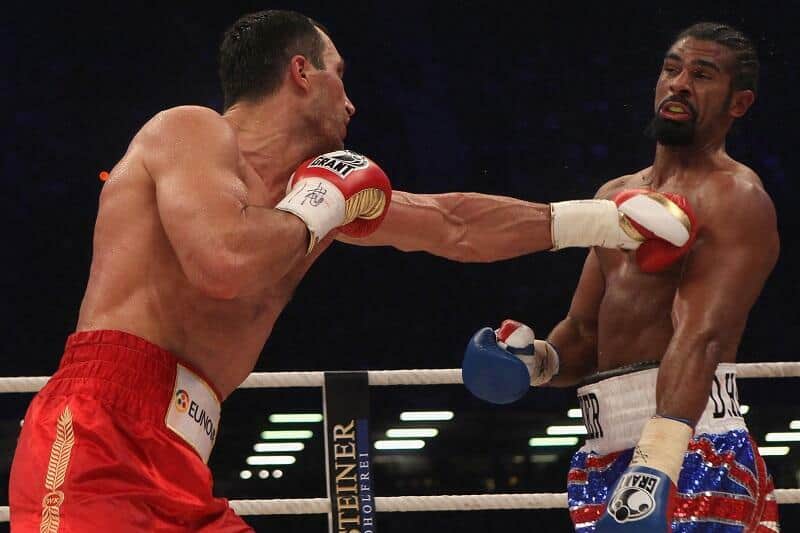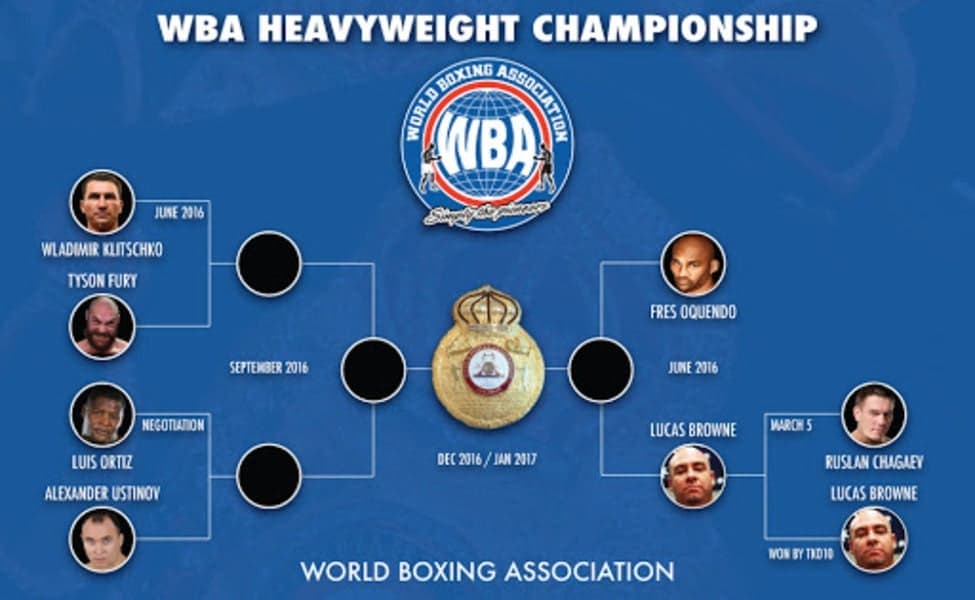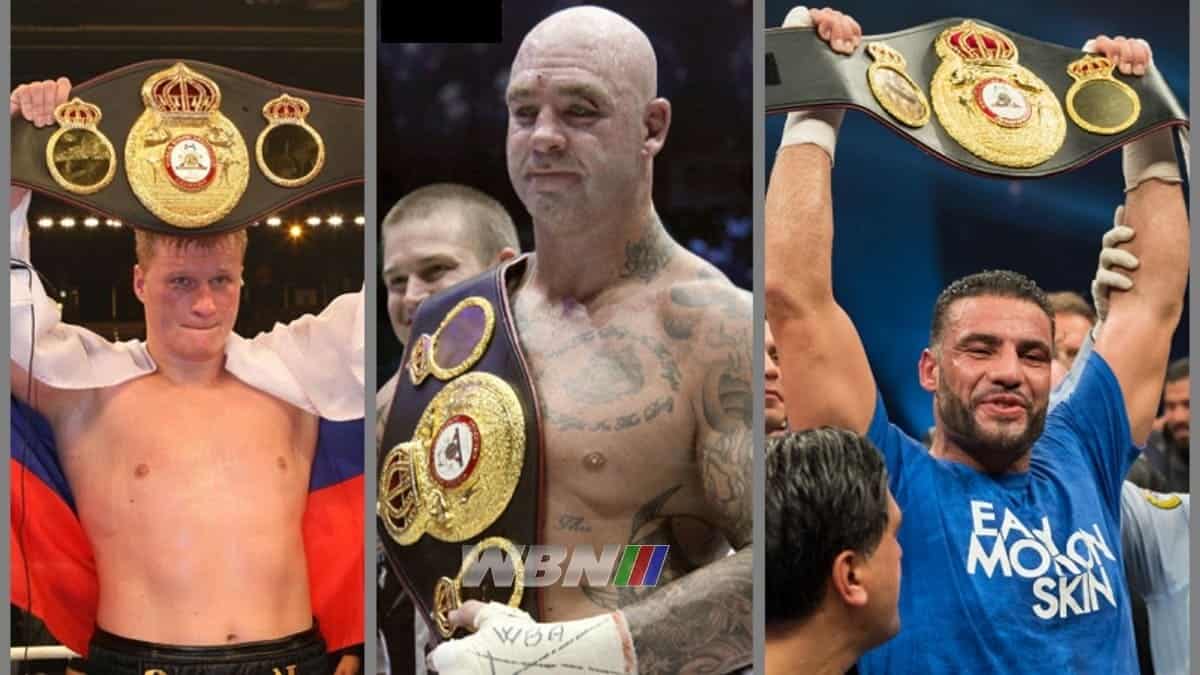World Boxing News outlines the WBA heavyweight title split in 2011 and the belt’s cursed past over thirteen controversy-laden years.
It’s no secret that WBN has closely followed the situation regarding the World Boxing Association’s heavyweight division over the years. For the most part, confusion has reigned supreme.
In 2023, the scenario sunk to a new low despite the belt being diminished in August 2023. A month later, the WBA reinstated the damaged title.
What is the WBA Regular Heavyweight Title?
In 2011, when WBN was barely a year old, David Haye fought Wladimir Klitschko amidst a frenzy from excited European boxing fans. They were finally getting the fight they wanted. And thanks to the WBA, four versions of the top division crown would be unified at the same time.
If Haye won – as the WBA belt holder- the possibility that fans could see the first three-belt heavyweight champion in ten years was real. Wladimir’s brother Vitali held the WBC strap, the only other not on the line and in his younger sibling’s possession.
Haye knew the stakes were very high. Victory over Wladimir would lead to an immediate clash with his Vitali and the chance to go for all the marbles. Sadly, after a busted toe and a misfiring performance, Klitschko added the WBA title to his IBF and WBO.

But the WBA surprised everyone by declaring Klitschko their new ‘super’ champion. This move was the most controversial in the history of championships in the heavyweight ranks.
The WBA would soon give boxing fans yet another belt to further muddy the waters.
The first WBA Regular champion
The WBA sanctioned Alexander Povetkin vs. Ruslan Chagaev in late 2011 for what was eventually named the ‘WBA Regular’ title, polarizing fans wholly and immediately.
Those who wanted to see Olympic star Povetkin get his shot were all for it. However, the rest of the boxing community wondered why we needed another belt in the top division.
On the surface, the move was seen simply as a ploy to garner more sanctioning fees from fighters.
Povetkin held the ‘Regular’ until 2013 when the WBA eventually ordered a fight with Klitschko. It was immediately thought that Klitschko vs Povetkin would mean the end of the short-term title. That was a wrong assumption.
Klitschko vs. Povetkin, which just so happened to be the most lucrative heavyweight title bout since Lennox Lewis vs. Mike Tyson and was sanctioned by the WBA under an unbelievable purse bid of $17 million, would be the only time WBA sanctioning chiefs would insist the ‘Regular’ holder gets a full shot.
It’s not hard to see why.
WBA broken promises to WBN
At this time, WBN was in constant contact with Gilberto J. Mendoza, the WBA’s vice president but acting President. He told WBN they would unlikely bring back the ‘Regular’ championship once Povetkin dropped the title. It was a promise that had not been kept.
“No representative or promoter has contacted us about the WBA heavyweight title,” Mendoza told World Boxing News in January 2014. “But also, the WBA super and interim titles might change. We are not sure the regular title will be approved.”
Within two months, the WBA controversially called for Fres Oquendo and Ruslan Chagaev to compete for the vacant title.
Looking back, I bet they wish they hadn’t bothered. The belt has seemingly been cursed ever since. It was only contested four times in the next six years.
After missing his flight, Oquendo almost missed the Chavaev fight. They then fought out a highly controversial majority decision.
Chagaev had taken the title, but after an appeal, the WBA granted Oquendo’s request for a rematch. It never happened.
Injuries, delays, and a complete farce saw the WBA allow Chagaev to continue making defenses. He defeated Francesco Pianeta before Lucas Browne earned his mandatory shot.
Browne won the title in a shock Grozny beatdown, ending Chagaev’s career. Amazingly, Browne was then flagged for a banned substance.
Claims of Russian food tampering and a set-up followed before the Australian eventually cleared his name. But by this time, the title was vacant.
Failed WBA heavyweight tournament
Vice President Mendoza had outlined a tournament that would be held, including the WBA ‘Regular’ and WBA ‘Super’ to eventually crown one sole champion.
Mendoza had again informed WBN that he would phase out the ‘Regular’ belt after the competition was over.
Eight fighters were called up as the round-robin looked [pictured below].
Browne was included after lobbying to overturn his WBA ban. Due to ‘The Big O’ Oquendo’ still not being given his shot from the Chagaev mess—and continually winning rounds of legal battles to do so—they were pitted together in the semi-finals.
It represented a sort of bye through the first round.

For his part, ‘Super’ champ Klitschko was already facing Tyson Fury in November 2015. Luis Ortiz would then take on Alexander Ustinov for the interim title.
So now, there were three titles on the spinning plates propped up by the WBA sanctioning fee merry-go-round. Whoever eventually came out on top would be the sole ruler. But only one of those bouts ever took place – Klitschko vs Fury.
Breaking up the belts
As we all know, Fury won but spiraled out of control and eventually gave up all the belts following the Dusseldorf upset. But this situation killed the tournament plans stone dead.
Browne missed out, Oquendo did yet again, and the ‘Regular’ strap somehow ended up in the hands of Mahmoud’ Manuel’ Charr.
Charr defeated Alexander Ustinov in November 2017 when the WBA sanctioned the fight out of the blue. Under the terms of Browne having his name cleared, it seems Charr was never ordered to face Browne. This was due, maybe in part, to ongoing litigation by Oquendo.
How Ustinov was approved is anyone’s guess.
Eventually, a fight with Charr was stipulated with Oquendo in 2018 before Trevor Bryan claimed the interim version. But again, the WBA had three boxers holding titles. Not to stop there, the WBA then invented the WBA Gold Championship, which Joe Joyce first held. Now, they had four. To add insult to injury, the aging Oquendo still awaited his chance.
The baton passed to Charr and Bryan to fight and finally remove the interim version. The fight never happened. Charr and Bryan held a purse bid won by Don King for $2 million before Oquendo said, ‘Hold on, I won a legal challenge to that.’
Rather than fighting, Oquendo wanted to take a monetary settlement as he approached his fifties. He kept that legal action going to recoup his losses.
Interim titles abolished
Only when the WBA faced allegations of racism by a judge did they finally abolish the interim titles in all divisions.
Bryan then fought Daniel Dubois, who was the interim champion. Dubois took the regular championship but was not recognized as a world titleholder due to the diluted nature of the belt.
Eventually, Dubois lost to Usyk, and the belt was supposed to be gone forever. It proved not to be the case as Charr fought legally to have himself re-coronated as secondary champion following a short recess period.
He was due to defend the title for the first time in seven years against Kubrat Pulev on March 30, only for the fight to be added to the curse. Five months on, it seems no closer to getting over the line. At this rate, Charr will head into an eighth year as a champion without a solitary defense to his name.
Fans have grown tired of the WBA’s broken promises. The WBA unified several divisions but not the most lucrative top division until the summer of 2024. Since then, old habits have begun to die hard as the WBA brings gold, interim, and other belts back into the fray.
A disagreement with BoxRec has removed the WBA from the statistics website altogether. Due to this reversal of action, WBN is again considering removing it as a recognized sanctioning body.
But we are still waiting for one sole champion in the heavyweight division. Unsurprisingly, the weight class earns the most sanctioning fees of all.
Read all articles and exclusive interviews by Phil Jay. Learn more about the author, experienced boxing writer, and World Boxing News Editor since 2010. Follow on Twitter @PhilJWBN.





